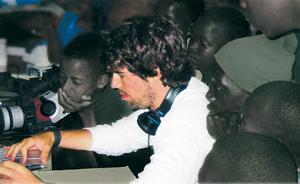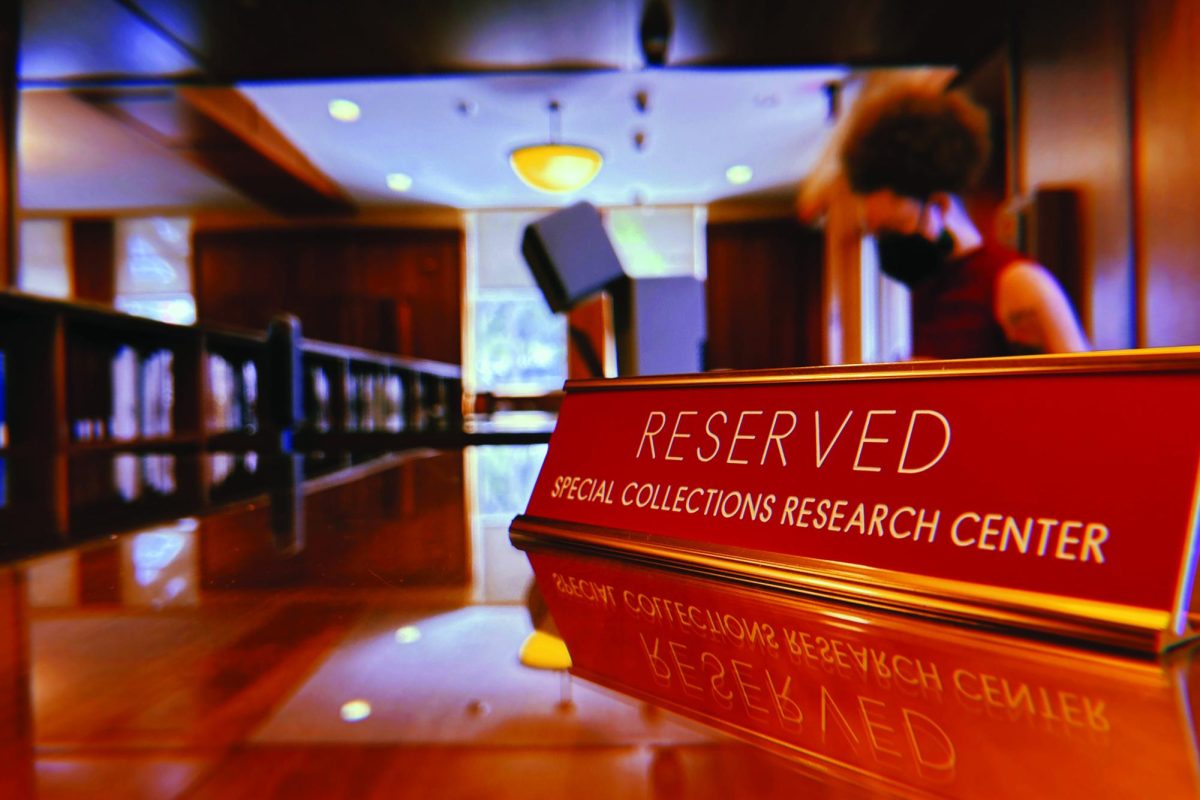For alumnus Kip Kroeger, his chance to be a documentary film producer came in 2003 with a 4 a.m. phone call from friend Charlie Ebersol about a school in poverty-stricken Soweto, South Africa. Ebersol had flown to Soweto after friend Peter Wheeler approached him about making a film about the school. When Kroeger watched the footage from Charlie’s trip, he turned to Charlie and said, “We have to figure out how to make it to Africa to make that film.”
Kroeger helped produce a documentary entitled Ithuteng (Never Stop Learning) that follows the lives of students at the South African school, students who suffer from abuse, crime and AIDS. A woman named Jackey Maarohanye, known as Mama Jackey, started the school in the late ’90s.
The film’s focus is the stories of three students: Dineo, a 14-year-old rape victim, Lebo, a 22-year-old rape victim who is infected with AIDS, and Victor, a 26-year-old criminal who helps run the school.
William Ebersol, Charlie’s brother and 16 years old at the time, directed the film.
The film was shot in 17 days with a $23,000 budget, which is highly unusual for a film. According to Ebersol, they raised money by sneaking into Fox Studios pretending to be production assistants, using fax and copy machines to raise money and get in touch with celebrities.
“It wasn’t until two weeks before we left when my dad asked how much we raised,” Charlie Ebersol said. “He said, ‘Give it all back, I’ll lend you the money, and you can pay me back when you sell the movie.'”
They spent 20 hours a day shooting for 17 straight days, but according to Ebersol, that wasn’t the hardest part. The hardest part, he said, was watching the children tell their stories.
One specific day of filming that Ebersol said was difficult was filming a man getting his head shaved because he was going to prison. The man had been growing dreadlocks for five years.
“We had to back off and let it happen on camera, and that was what the true storytelling was,” Ebersol said. “And that’s really, really hard.”
Ebersol mentioned the infamous photograph from the Vietnam War of the young Vietnamese girl running down the street after a Napalm attack. The photographer wrote an essay about his debate of whether to take the picture and then try to pick the girl up, or put the camera down and help her.
“The hardest thing in the world about being a documentary filmmaker is making that decision for himself,” Ebersol said. “A good filmmaker takes the picture because he’s making it in hopes of helping other people.”
Apple donated several laptops and Canon donated several cameras. Ebersol said that two years ago, Bono gave them the song “One” completely free.
“If you just decide to do something and you’re passionate about it, people gravitate to that,” Ebersol said.
The crew consisted of the three men, two ground managers that live in South Africa, a security guard and a driver.
“We were going to be in Soweto, but it is ranked by ‘US News & World Report’ as one of the five worst places in the world,” Kroeger said. “It’s random with its crime and extreme poverty that you and I can’t even imagine.”
Kroeger said Soweto was originally designed for 250,000 people as a township outside of Johannesburg. Current estimates, which are low, are putting it at 4.5 million.
Oprah Winfrey saw the film on a plane to Johannesburg in June, inspiring her to write a check for $1 million to the school. Kroeger said they showed the film to Gayle King, asking her to show the film to Oprah.
Almost nine months ago at 7 a.m., Ebersol got a phone call from King saying Oprah was with her.
“Oprah said, ‘I just wanted to tell you I saw your film on my trip over here and it was amazing and when we landed I drove over to the school and gave Mama $1 million,'” Kroeger said. “And Charlie goes, ‘You don’t understand how just last week they got the notice that their power and water are being turned off this week because they couldn’t pay their bills.'”
The next day, Oprah went back to the school and gave the school one million gran, equaling a couple hundred thousand dollars, in cash so they could pay the bills immediately.
“It’s been amazing. It’s really surreal in the sense that I still can’t really get my head around it,” Kroeger said. “I was making a delivery yesterday for Scrubs and one of the women I delivered to said, ‘I heard you were going to be on Oprah tomorrow,’ and it still surprises me how wide-spread it is.”
Oprah is airing a show about the documentary within the next three weeks. The film has been bought by HBO and is scheduled to air in the fall.
“HBO is like every filmmaker’s and documentarian’s dream, well, other than Michael Moore,” Ebersol said. “It’s like the ultimate stamp of approval. It was when HBO bought the film that it’s like, you’re real filmmakers.”
Ithuteng was awarded Best Humanitarian Film at the 2005 Mountain Film Festival in Telluride, Col.
Kroeger and Ebersol worked on different projects together in high school and they made a music video for Weekend Excursion and a rap group the summer before they made the documentary.
“Every time we would work together it was so invigorating and exciting, and our projects would grow every time,” Kroeger said. “It was so natural. I had so much fun doing it and to find out that I could make a career out of it was like an added bonus.”
Ebersol knew he wanted to work in the movie business when he was seven years old, when he realized that he couldn’t be both Bruce Springsteen and a fireman at the same time.
“When I was seven years old I used to run around my house pretending to be a police officer, a fireman, Bruce Springsteen, as my brother reminded me, Hulk Hogan,” he said. “I wanted to be all of those things when I grew up and I had the foresight to know that I couldn’t be both Bruce and a fireman at the same time. I realized that if I worked in the movie business I could be all of those things.”
Kroeger graduated with a degree in Biology. He is currently living in Los Angeles and working as a post-production assistant for the TV show Scrubs. Ultimately, he said, he would like to be a producer.
“I’m probably going to stay here [with Scrubs] as long as I can because … it’s an amazing show,” Kroeger said. “The people that run it are brilliant and funny and it’s one of the best places I’ve ever worked, and I would love to produce TV ultimately and films as well.”




